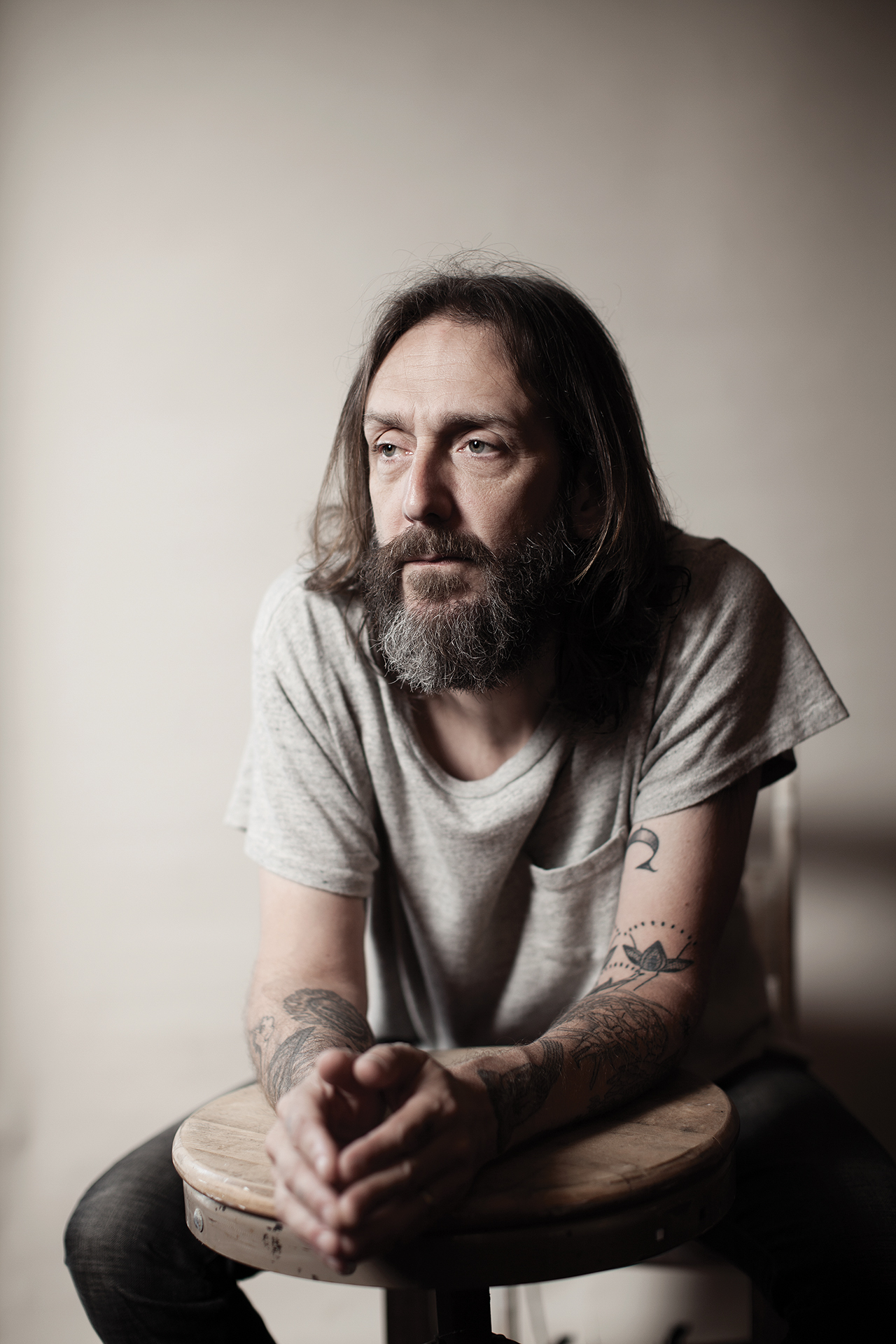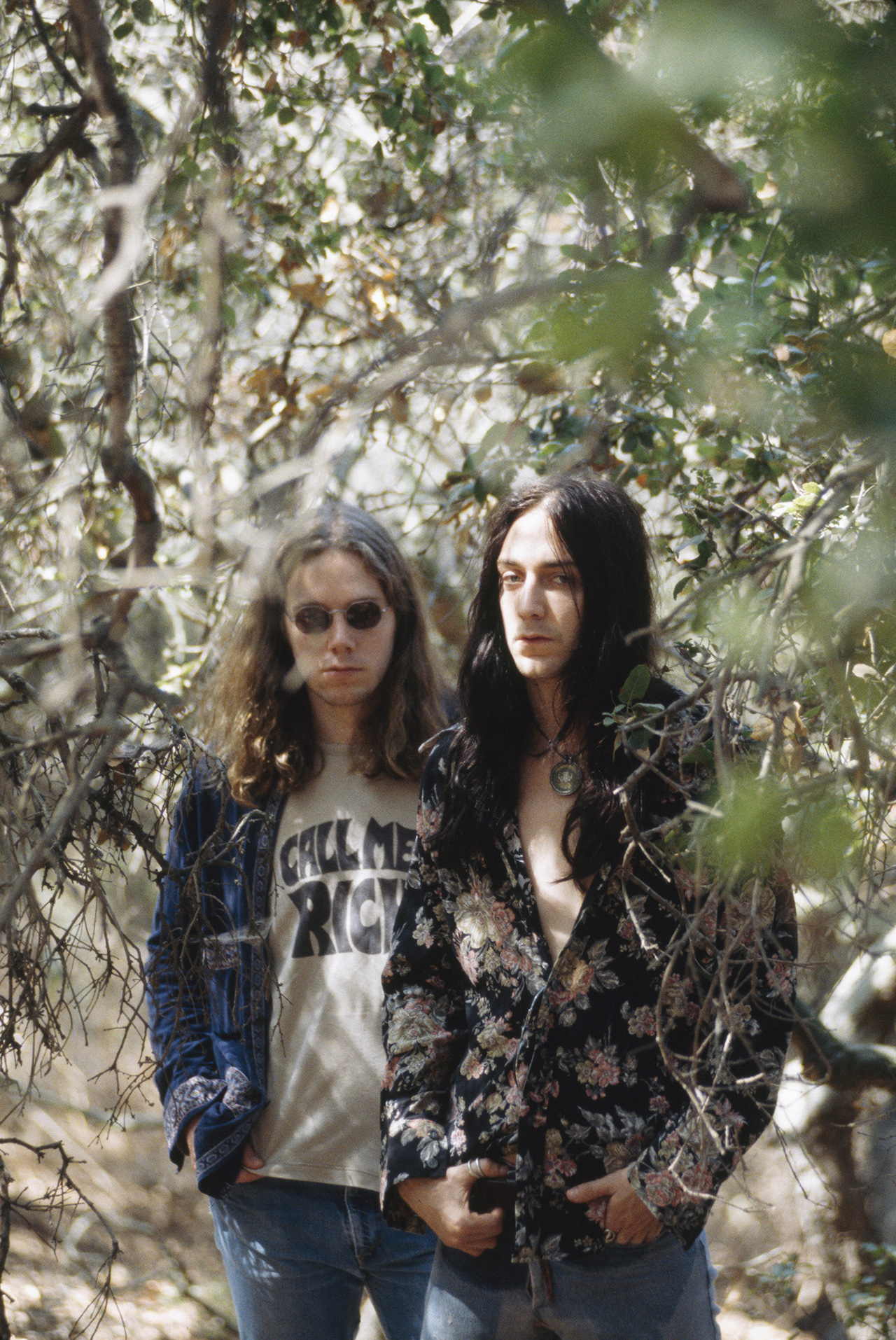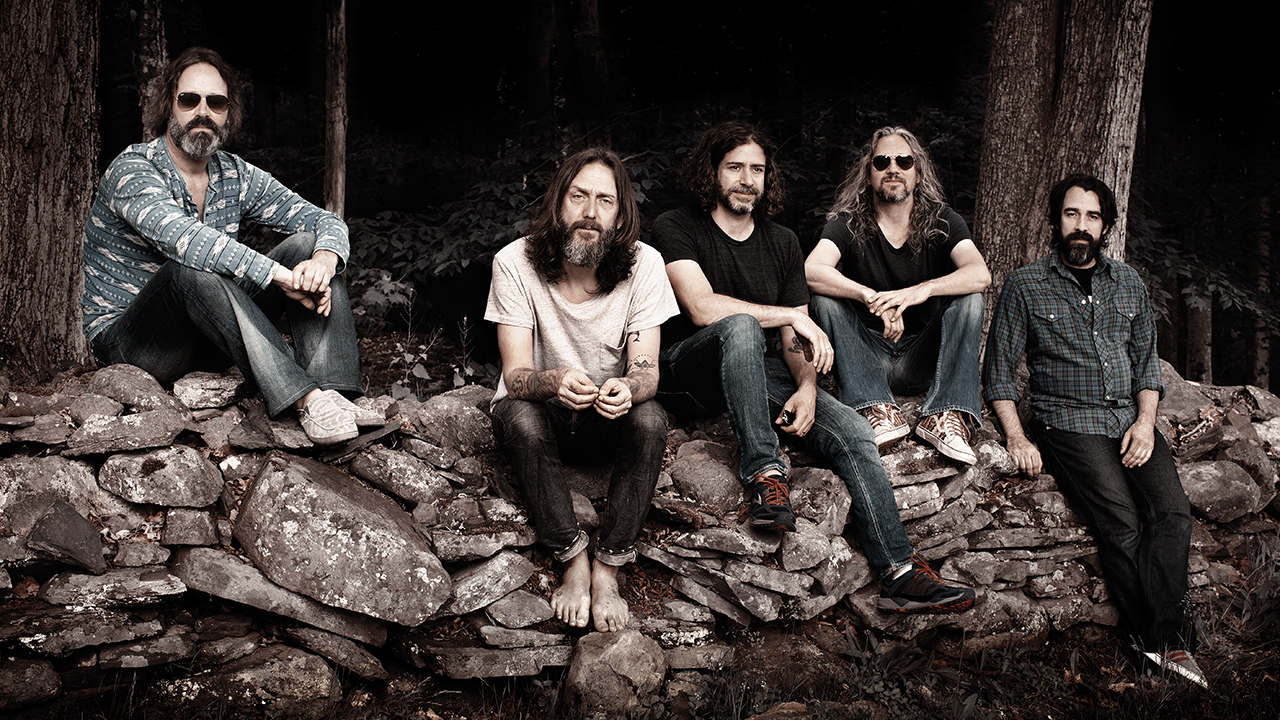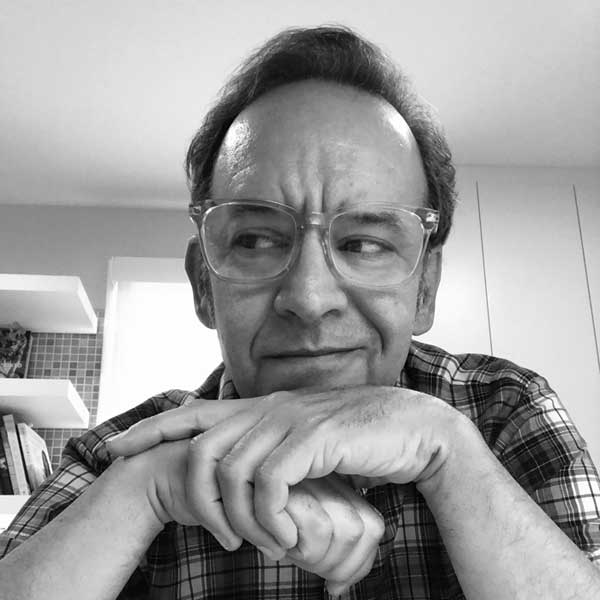It’s pouring down in downtown Knoxville. Sheets of rain are running down the large windows of the Prevost USA Coach tour bus, creating an instant Monet of the Bijou Theatre, the early-1900s former vaudeville house that tonight plays host to the Chris Robinson Brotherhood. Sitting on the bus’s worn leather fold-down couches, talking with band members Neal Casal, Adam MacDougall, Jeff Hill and Tony Leone amid burbling water sounds, there’s a feeling of being in a submarine – albeit one in which the air is tinged with a pungent herbal aroma. And suddenly, here comes their cosmic captain, bounding aboard out of the rain.
Wearing jeans and a blue-and-yellow striped T-shirt, Chris Robinson looks like a hirsute Beach Boy. At 49 he still has the spidery build and slightly manic air he had in his days fronting the Black Crowes, but the bushy beard and soft lines around his pale blue eyes give him the look of a beatific guru, as drawn by Mad magazine’s Don Martin.
Glancing at my tape recorder, Robinson says with a grin, “This is being recorded for quality-control training purposes, to make sure my employees are all doing their jobs!”

Since 2010, the Brotherhood, give or take a few line-up changes, have been building a remarkably independent rock’n’roll future, off the grid of the music business and away from the Crowes’ stormy legacy. No label, no radio play, no corporate sponsorship, but a growing legion of fans who travel from town to town to be part of their marathon love-fests. Later that night, thanks to circulating live bootlegs, most of the 30- and 40-something tye-dyed audience will already be singing and swaying along to songs from Anyway You Love, We Know How You Feel, the band’s new album, a month before its release. With hints of Sly & The Family Stone, Little Feat, the Flying Burrito Brothers, Grateful Dead and Gong, the record is another shot of 1970s-influenced chooglin’ psychedelia, its six-minute-plus tunes laced with what Robinson calls “hippie baroque” lyrics. Most of all there’s an overriding sense on the album that this is a band that pledges allegiance to the giant ‘F’ (for Freak America) flag that hangs over their stage.
“We’re definitely not in the normal music business any more,” Robinson tells Classic Rock. “It may look normal from the outside – we’re on a bus, we tour, we make records – but for most of us, who’ve been in different projects and dealt with things, because of our age, and time and space, perception has changed. To be on a major label at this time in our lives, we never would have the kind of freedom we have. That was the impetus for the Brotherhood. And it’s still where we are now.
“Maybe the average person who’s had the sort of career that I’ve had, you’d stick with what you know, play the hits,” he continues. “People close to us – booking agents and managers – didn’t really understand the Brotherhood, the way I wanted to do it. When we started I’d be asked in interviews: ‘Does this seem like a step down to you? You were a giant rock star once. Now you’re setting up your own gear.’ And my point would be: ‘That’s how you think something should be. It has nothing to do with what we’re building, or the pragmatic invocation of how we can make it happen so we’re free from that machinery.’ You have to be with a group of people who understand that the music comes first. If the music isn’t happening, why bother? This feels connected to how I grew up – a lot of singing folk songs in the house. The first real awakening as a five-year-old was going to hootenannies, with everyone sitting around sharing songs and playing fiddles and guitars. That still resonates with me. The best times of my life have always been around music.”
Until they weren’t. On the subject of The Black Crowes’ acrimonious split in 2015, Robinson is terse, saying his brother Rich and the other band members have “laid their cards on the table”, and there will be no more reunions because he doesn’t want to “spend my life around people who don’t like each other”.
CRB keyboard player Adam MacDougall, who was in the final incarnation of The Black Crowes, sees a difference not only in the Brotherhood’s laid‑back approach, but also in Robinson himself. “Chris is happier now, much more relaxed,” he says. “Most of the time, we have a turntable on the bus, we’re playing records. It feels like a family. I think he can be more himself. In the Crowes there’s twenty years of history, lots of pressure and expectations. It’s a business juggernaut. If Chris doesn’t act the same way he did at twenty-three when the fans saw him when they were in college, and sing in the same range, they’re disappointed. It’s hard to have your audience be satisfied as you get older if they’re expecting you to be who you were. So how do you make those songs wear their grey hairs well? With the Brotherhood our music comes out of the womb with grey hairs,” he says with a laugh.”
With greying beards all around, and two band members’ live associations with Grateful Dead men Bob Weir and Phil Lesh, it’s hard not to see a kind of symbolic torch being passed down from that band. Indeed Anyway You Love was deliberately hatched in what Neal Casal, guitarist and Robinson’s main co-writer, calls “the heart of Dead country”.
“The studio was in Marin County, on Stinson Beach,” Casal says. “It was this incredible house built in the sixties on the side of a mountain, from stones from San Francisco streets and wooden pillars from old bridges. The house is literally built out of San Francisco. There’s a clock tower, a window that looks out over the ocean, a few bedrooms and a lot of world-class recording gear. We all felt really inspired there.”
“We went in with only three finished songs, so it was a little nerve-racking,” adds new drummer Tony Leone. “But all the rest of it seemed to flow out in a very short amount of time. I didn’t know what to expect going in, but I think we surprised ourselves.”
Robinson describes the way that casual magic happens in the studio: “We’ll all be making tea, rolling joints, hanging out, and I’ll be playing something, singing a couple of lines that I’m working on. Sometimes no one stops doing what they’re doing. ‘Hmm, okay, so no one’s interested in that idea…’ So I’ll turn the page in my notebook and play another idea, and then it’s like meerkats, everybody perks up. ‘Oh, what was that?’ It takes somebody else’s belief in something to begin the occult practice of focus and transferring that energy to make a new song. A few hours later we can have something really powerful. More than any other session I’ve ever been part of, that’s how these songs were done. Our ultimate goal is to have something that somehow lives up to all the great music we love.”
Indeed, the album’s standout tracks – California Hymn, Leave My Guitar Alone, Oak Apple Day and Narcissus Soaking Wet – do have the timeless sound of a band tapping into the source, what Robinson calls “cosmic consciousness”.
“You want your vision and your emotion to be clear,” he says. “The writing has to exist outside of questions like: ‘Is this hip?’ ‘Is this cool?’ You look at modern music, it’s more homogenous than ever. It’s hard to find anything unique. We meet people all the time who love music on a level that’s not just commerce or fashion; like us. But the average musician now doesn’t want to work hard on their music or be humble in the tradition that we work in, they want to be famous and make a lot of money. But if you want to be famous and make a lot of money, playing fucking rock’n’roll is probably not what you want to be doing right now.”
Along with rejecting the traditional label model, Robinson says the Brotherhood tread lightly on social media. “We do Instagram and Twitter, but we don’t use them that much. Not like some other artists, where every single aspect of their existence is on display. We don’t have any live shit from the studio. It’s boring anyway. It’s like trying to describe to someone your acid trip. The intimacy of writing and making records in private is kind of part of the safety and the sacredness of it.”
“It’s also kind of presumptuous,” Casal adds. “Like, you get to see us recording every moment, assuming that everything we do is so great. It’s not. In this band we might record eight hours to get eight minutes that we’ll keep.”

Standing among the audience at the Bijou Theater before the Brotherhood concert, the social networking is positively old-school – a lot of friendly hugging, sharing of flasks, chatting, comparing T-shirts and set-lists from shows the previous week. And once the music starts there are no smartphones or tablets held aloft to interrupt the communal flow from band to audience. It’s a vintage vibe. It could be 1975.
“Part of our group mind and our counterculture nature is how can we remove ourselves from these different games,” Robinson says. “If anything, I think the way we run our business – our relationship with our audience – is indicative of all this outside stuff that we don’t want to be a part of. We don’t have to be involved. A lot of people in the psychedelic culture would see danger in Timothy Leary’s initial message. But ‘Tune in, turn on and drop out’ could easily be just about staying away from corporations and corporate-run media. It probably rings more true now than it did then. You don’t have to turn your back on society and move to a commune to drop out. You can just remove yourself from their occult trance machine. The Brotherhood is our own small Petri dish of culture and of something that’s different. There are always people who need to be outside the box they’re given.”
As all those outsiders had their visual totems and representations, the Brotherhood have relied on Robinson’s long‑time compadre and “resident mystic” Alan Forbes to design the striking artwork that adds mystique to their identity. “To me, the art and the imagery that Alan creates for us – the bear, the secret serpents, the mushroom, the owl – that stuff is equally as important as the music,” Robinson says. “I’ve worked with him since 1989. It’s a part of our live scene. People love the images, the album covers, the posters. The art is just another way that this band isn’t like the other bands. We’re in the jam band scene, but we’re not like the other jam bands. We’re a rock’n’roll band, but we have so much other shit in us that we’re not like the other rock’n’roll bands.
“And the boutique part of the visuals is like anything: farm-to-table restaurants, buying organic food in your community. It’s happening because the crack in the veneer is getting wider and wider, money’s tighter, and people are making more conscious choices about everything in their lives, from the food they eat to the music they listen to, to the things they support. I find that to be a great responsibility on my part, as somebody who’s spent the majority of my career staying away from the mainstream. I know it sounds weird to say that, because The Black Crowes were very successful. But we did it outside of any hype or outside of any trends, anything other than: ‘Well, this is the experience you have when you come see us live, and these are the songs I’m writing.’ That sort of cultural place is a huge part of the Brotherhood.”
Although Robinson says he appreciates Crowes acolytes such as Blackberry Smoke (“I named them!”) and The Temperance Movement, he doesn’t have much time for rock’n’roll ego any more. “We played at a festival in Australia a few years ago and that dude Zac Brown’s band was there. He’s got like a fifteen-person entourage of bodyguards and people who handle his biscuits or whatever the fuck they do. It was funny, because I’ve seen rock’n’roll: I’ve smoked a joint with Mick Jagger; I’ve played arenas; I’ve seen this and that from different angles. I was laughing because there were walkie-talkies and security, but there was no one for miles and miles.”
“In the Brotherhood we’re so far removed from that. We just walk around and do what we want. I’ll go out and play records until we start. That’s what I love about our scene. We’ll be playing three nights at the Fillmore later this year, and it’s like, how many people do you think we intimately know in the first eighteen rows? It’s hilarious. Our fans are super-cool. They never want anything except to know that we were at the same event together.
“We’re also one of the only bands that will tell people ‘no’,” Robinson continues. “No amount of money will make me change my mind if it’s something I don’t want to do. I’ve turned down more money than I made in my former life, turning down commercials and offers to make surprise appearances on stage. I didn’t get into this for those kind of reasons. Why would that be a motivating factor for me now? I’m no fool. I have a wife, I have children, and everybody likes nice things and wants a nice life, but I’m also surrounded by people who understand that money doesn’t buy you joy. The reason any of this is interesting at all is because we all jumped into the river – the music. That music starts with us as human beings in our earliest, ancient past, and it will take us to our distant future.”
Chris Robinson Brotherhood - Anyway You Love, We Know How You Feel album review

